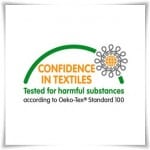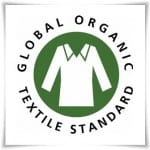OEKO-TEX® Standard 100
 The OEKO-TEX® Standard 100 is an independent testing and certification system for textile raw materials, intermediate and end products at all stages of production. Examples for items eligible for certification: Raw and dyed/finished yarns, raw and dyed/finished fabrics and knits, ready-made articles (all types of clothing, domestic and household textiles, bed linen, terry cloth items, textile toys and more).
The OEKO-TEX® Standard 100 is an independent testing and certification system for textile raw materials, intermediate and end products at all stages of production. Examples for items eligible for certification: Raw and dyed/finished yarns, raw and dyed/finished fabrics and knits, ready-made articles (all types of clothing, domestic and household textiles, bed linen, terry cloth items, textile toys and more).
Testing for harmful substances includes:
- illegal substances
- legally regulated substances
- known harmful (but not legally regulated) chemicals
- as well as parameters for health care
The Difference Between Oeko-Tex And Organic Certification
It is very unlikely that you see this Oeko-Tex logo on Organic Certification because Organic Certification is a much stricter system. Oeko-Tex standard 100 is not an indication that products are Certified. Some of the chemicals permitted under this listing are not permitted under GOTS (Global Organic Textile Standard). It does not control chemicals used by the farmers or ongoing manufacturers in their mills, does not control dye houses etc., does not control storage, transport, packaging, also there are no inspections taking place. All these matters are part of the organic control and certification system.
In their entirety the OEKO-TEX® Standard 100 requirements clearly exceed existing national legislation but is not as strict as Organic Certification Standards.
Glogal Organic Textile Standard
 During the early part of 2000, a number of independent certifiers got together to establish a common inspection and worldwide certification standard; GOTS, Global Organic Textile Standard was formed.
During the early part of 2000, a number of independent certifiers got together to establish a common inspection and worldwide certification standard; GOTS, Global Organic Textile Standard was formed.
GOTS issued permits to a selection of inspection and certifying companies around the world to inspect according to the standards set forth; there are only a select few so that control is easier to maintain.
These inspection companies are independent and are not controlled by outsiders.
The GOTS organic inspection process is most likely the tightest product control process in the world.
The Aim Of GOTS Standard is to define requirements to ensure organic status of textiles, from harvesting of the raw materials, through environmentally and socially responsible manufacturing up to labelling in order to provide a credible assurance to the end consumer.
This standard for organic textiles covers the production, processing, manufacturing, packaging, labelling, exportation, importation and distribution of all natural fibres. The final products may include, but are not limited to fibre products, yarns, fabrics and clothes.
The standards focus on compulsory criteria only.
- First of all, the fibres should be natural and have to be grown in an organic way, based on the production standards such as those laid down in the EEC-Regulation 834/2007, or NOP regulations.
- Second, the entire production process should be taken into account. This means that every processing step must meet certain criteria. The criteria for the production process are laid down in the Global Organic Textile Standards (GOTS). They encompass every process-step of textile production (spinning, weaving, washing, etc) and for every step it is laid down which processing aids may (not) be used, in order to gain as much environmental profit as possible.
Our Standard At Organature ®
WE MANUFACTURE ABOVE ORGANIC CERTIFICATION STANDARDS
Organature® works to European Organic Standards, as Australian and U.S. certifications are not good enough for Peter, our founder, who for many years suffered severely from M.C.S. (Multiple Chemical Sensitivity). He now only produces and supplies products that are safe for his own use, and those he has fully researched. We go to enormous lengths to provide you with these genuinely cleaner, healthier, chemical free goods. It all comes from a very personal level. Read more about our standards here.
For many years we were working with a mill in Indonesian, but they are no longer able to supply the quality organic cotton we like to use. Peter did not want to take a risk to place an order with a new company without seeing who he was dealing with, so he took a week off to travel to India (including 4 days flying and sitting at airports), but considered the trip to be a huge success.
The firm we are now purchasing from have three mills who all have GOTS organic certification. The premises were very clean and Peter detected absolutely no chemical smells. All three mills are in the area where the best quality crops are produced. They have very rich soil and natural underground water table, which is a perfect combination to grow organically. This beautiful Organic Cotton will now be used to manufacture our own high quality bedlinen and bedding fabrics in the future.





